

 2017 Japanese Language Program for Specialists in Cultural and Academic Fields (Short-term)
2017 Japanese Language Program for Specialists in Cultural and Academic Fields (Short-term)University of California, Santa Barbara
The two months I spent in the Japan Foundation’s Japanese language program for specialists was a truly invaluable experience. As a graduate student in linguistics at the University of California, Santa Barbara, I research the Kansai dialect of Japanese. Being presented with such an opportunity to study advanced Japanese geared towards researchers is very rare, and I am extremely grateful to have participated in a program so ideally suited to my current research goals.
One unique aspect of this program is the organization of course placement. Classes themselves are all intensive, but students are placed into different levels for different subjects depending on their individual levels. This reflects the reality that a student's speaking level may be high, but their kanji level may be low (as in my case), or vice versa. In addition, advanced classes are tailored to a researcher's needs, which made class content immediately relevant to my own goals (e.g. increasing my reading speed, learning kanji for linguistics terminology, grammar for academic writing, etc.). Most importantly, class size was very small (3-6 students), which meant individual attention from each instructor and high participation from every student. My only regret is that the program only lasted 2 months!
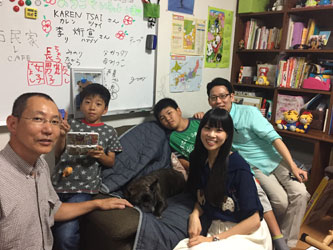 Studying abroad also provided me with new learning opportunities outside of the classroom, such as watching television or dramas with Japanese subtitles (unavailable in the US). Besides constantly using Japanese whenever we go out, the program also organized several events to help create camaraderie between students and make opportunities to go out and use Japanese. A day touring Osaka in small teams (including a list of tasks requiring interactions with Japanese people), visiting a host family, attending a cultural exchange meeting with Kobe University students, and watching Bunraku were just some of the activities I participated in.
Studying abroad also provided me with new learning opportunities outside of the classroom, such as watching television or dramas with Japanese subtitles (unavailable in the US). Besides constantly using Japanese whenever we go out, the program also organized several events to help create camaraderie between students and make opportunities to go out and use Japanese. A day touring Osaka in small teams (including a list of tasks requiring interactions with Japanese people), visiting a host family, attending a cultural exchange meeting with Kobe University students, and watching Bunraku were just some of the activities I participated in.
A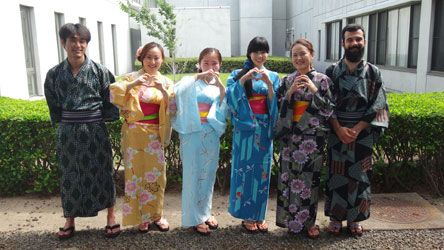 nother strength of this program was the regular one-on-one check-ins with each student. This also included creation of personal goals at the beginning of the program and reflection of your own progress towards those goals at the end of the program. Not only did this give me concrete mini-checkpoints to strive towards during the program, but it also made me reflect on my reasons for participating in the program. It left me with a great sense of accomplishment at the end. The individual meetings also made me feel extremely supported by the center, staff, and teachers.
nother strength of this program was the regular one-on-one check-ins with each student. This also included creation of personal goals at the beginning of the program and reflection of your own progress towards those goals at the end of the program. Not only did this give me concrete mini-checkpoints to strive towards during the program, but it also made me reflect on my reasons for participating in the program. It left me with a great sense of accomplishment at the end. The individual meetings also made me feel extremely supported by the center, staff, and teachers.
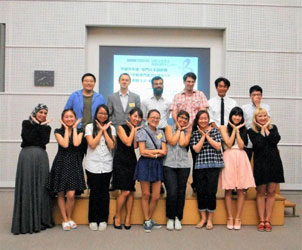 The program also requires everyone to give a presentation on their research, which is an excellent way to make students apply what they have learned. It was also more one-on-one time with our teachers, which I really appreciated. This particular aspect of the program was hugely and immediately helpful to me. After completing the 2-month program, I remained in Japan for a few weeks to conduct research. I have been recruiting participants and collecting linguistic data. The speech I wrote for the presentation has been extremely useful when discussing and explaining my research to others. After the final presentation, I was also approached by two Japanese high school teachers interested in my research and willing to help me recruit speakers of Kansai Japanese.
The program also requires everyone to give a presentation on their research, which is an excellent way to make students apply what they have learned. It was also more one-on-one time with our teachers, which I really appreciated. This particular aspect of the program was hugely and immediately helpful to me. After completing the 2-month program, I remained in Japan for a few weeks to conduct research. I have been recruiting participants and collecting linguistic data. The speech I wrote for the presentation has been extremely useful when discussing and explaining my research to others. After the final presentation, I was also approached by two Japanese high school teachers interested in my research and willing to help me recruit speakers of Kansai Japanese.
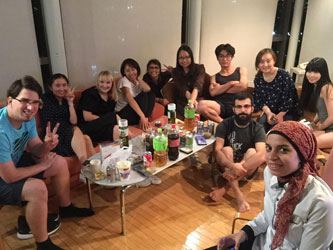 Overall, networking has been perhaps the most invaluable part of my experience. Besides the many connections I made at the Japan Foundation (teachers, staff, classmates, residents of Tajiri-cho), everything I learned during the 2-month program has been immediately useful to my research. As part of an assignment for a class on writing emails, I found a linguistics conference taking place at NINJAL in Tokyo this summer. After the program ended, I decided to attend the conference, and I met many Japanese professors who then helped me with my research by recruiting participants for me. Thanks to this program, I have now made several connections with Japanese professors and graduate students in my field of research (Japanese dialects) at several Japanese universities. I have even been invited to submit my research papers to dialect journals and future conferences.
Overall, networking has been perhaps the most invaluable part of my experience. Besides the many connections I made at the Japan Foundation (teachers, staff, classmates, residents of Tajiri-cho), everything I learned during the 2-month program has been immediately useful to my research. As part of an assignment for a class on writing emails, I found a linguistics conference taking place at NINJAL in Tokyo this summer. After the program ended, I decided to attend the conference, and I met many Japanese professors who then helped me with my research by recruiting participants for me. Thanks to this program, I have now made several connections with Japanese professors and graduate students in my field of research (Japanese dialects) at several Japanese universities. I have even been invited to submit my research papers to dialect journals and future conferences.
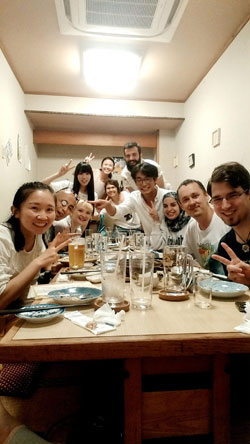 Besides academic connections, I also made strong friendships with my fellow classmates. The other participants in the 2-month program came from all around the globe -- Italy, Hungary, Egypt, Russia, Korea, China, Taiwan, Canada, America, New Zealand -- and we all had a common interest in Japanese/Japan. Meeting people of different cultural (and linguistic) backgrounds was such a special opportunity. I am extremely grateful to have made so many wonderful memories with everyone.
Besides academic connections, I also made strong friendships with my fellow classmates. The other participants in the 2-month program came from all around the globe -- Italy, Hungary, Egypt, Russia, Korea, China, Taiwan, Canada, America, New Zealand -- and we all had a common interest in Japanese/Japan. Meeting people of different cultural (and linguistic) backgrounds was such a special opportunity. I am extremely grateful to have made so many wonderful memories with everyone.
Not only was this program a useful course that improved my Japanese in all traditional areas (kanji, reading, writing, speaking, grammar), it offered unique classes relevant to my research needs (reading speed, academic grammar, field-specific kanji, presentation of individual research topics). Besides training in the Japanese language, the various connections I was able to make with people within and outside the center are essential to my current and future research career. I cannot express just how much this program has furthered my research abilities. I will always be grateful for this amazing and wonderful experience!